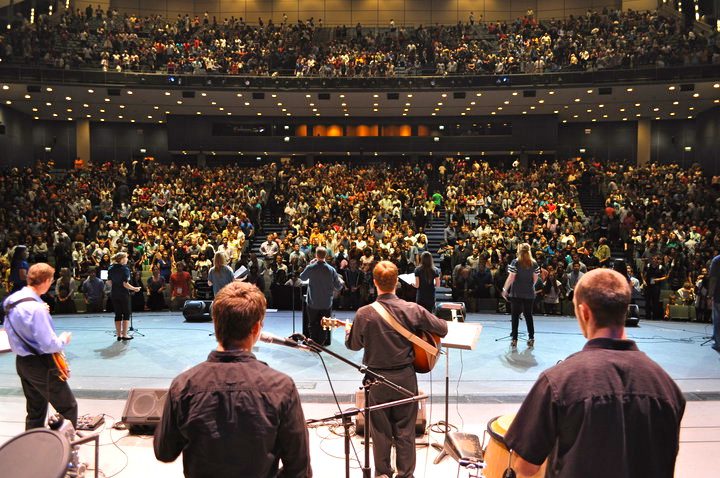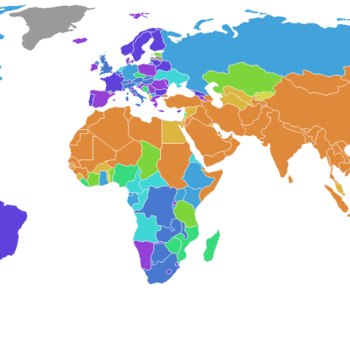As of 2020, there were some 21 million Christians who attend “non-denominational” churches, passing the Southern Baptists (with 17 million) as America’s largest segment of Protestants. Some are saying that church denominations are obsolete. But non-denominational churches are so similar with each other in their evangelical theology and their congregational polity that they really constitute a denomination unto themselves.
Mark Tooley, the director of the Institute on Religion & Democracy, has written an article entitled Post-Denominational America “American denominationalism is fading,” he writes. “Non-denominationals are now the largest non-Catholic religious group in America. Nearly all denominations are declining. Liberal ones are declining faster than conservative ones. Nearly all growing congregations are non-denominational.”
He writes,
Perhaps America has only one remaining “great” denomination, which is the Southern Baptist Convention. A “great” denomination is national, has millions of members, has universities and colleges, seminaries, publishing houses, journals, and transgenerational brand loyalty. But the Southern Baptist Convention is annually losing hundreds of thousands of members. Many of its most successful congregations now disguise their denominational tie. And even many ardent church members no longer relate strongly to the denominational brand. They and their children move seamlessly among evangelical congregations. Many if not most nondenominational churches are effectively Baptist in theology and polity, governed congregationally, through elders, and practicing believer’s baptism.
My first impulse was to think, What about us Missouri Synod Lutherans? We have nearly two million members, but I guess that’s just short of the plural “millions.” We have nine colleges, two seminaries, Concordia Publishing House, lots of official and unofficial journals, and quite a bit of transgenerational brand loyalty. We may not be a “great” denomination like the Baptists, but, darn it, we are pretty good.
Now you would expect congregations that don’t want to identify with any particular theology or church tradition to be very diverse in what they believe. But they aren’t! Non-denominational churches are very similar to each other. They are nearly all Arminian in practicing “decision theology,” seeing salvation in terms of an act of the will, with perhaps a little dose of Calvinism in “once saved, always saved.” I don”t know of any that baptize infants. In fact, they don’t put much store on any of the sacraments. And, from what I can tell, they all worship the same way, with praise bands and contemporary music. Some may be charismatic, while others are not. And they may be political to different extents. But they all hold to the same basic evangelical theology.
In fact, their polity is also in that same tradition. They are simply hyper-congregationalist. Most strains of evangelicalism are congregational, with few if any authoritative structures outside the individual congregation. Historically, many congregationalists have formed associations with other congregationalists. But this, strictly speaking, isn’t necessary. In fact, doing so may even work against true congregationalism.
So the Baptists should not feel too bad about being surpassed by the non-denoms. As Tooley says, most of the non-denominational churches are Baptist in both theology and polity.
Lutherans can have different polities, with some having bishops, though we Missouri Synod Lutherans have a stronger focus on the authority of individual congregations. And yet, our congregations form relationships with others of the same confession. The word “synod” derives from the Greek word for “path” combined with the word for “with,” so that it means people traveling with each other on the same path. Our congregations are walking together, agreeing with each other and supporting each other. This includes educating pastors, publishing educational resources, and the like. But also providing doctrinal review for those resources and supervising pastors to make sure they teach rightly and function as they should. We have a unity of confession, which creates a particular fellowship among us.
Church bodies with a particular polity, such as Presbyterians or Episcopalians, will need to keep their “denominational” structures and relationships. So will sacramental churches. And churches that have a high view of church fellowship, which prevents them from “moving seamlessly” from one church to another. So will congregations that hold to a particular theological confession.
The word “denomination” simply refers to a “naming.” There is nothing intrinsically institutional about it. Different strains of Christianity have names. “Non-denominational” is a name, and, thus, ironically, a denomination. Maybe by Tooley’s definition a “great” denomination. Non-denominational churches do have their own schools, publishing houses, networks, etc., in the plethora of non-denominational “para-church” ministries.
Tooley does say this:
While the importance of denominations and their structures decline, the traditions that birthed them will not. Lutheranism, Calvinism, Anglicanism, Wesleyanism, Restorationism, and various flavors of Baptists, will continue and often will thrive in America, if not always carefully stewarded by denominations. And while post-denominational, contemporary populist piety will always thrive, behind it there will always by more rigorous outlines of orthodox Protestant theology providing some ballast.
Baptists have been able to accommodate, to a degree, elements of both Calvinism and Wesleyan Arminianism in their midst, though not without conflict.. But it’s hard to imagine how a non-denominational congregation could also include Lutherans or Anglicans. How would this inclusive church body worship? Would it baptize infants? How would it handle Holy Communion? Lutheranism, at least, doesn’t work well as just a private opinion.
I suspect that the “ballast” of the “more rigorous outlines of orthodox Protestant theology” will have to come from the traditions that retain their identity, their structures, and their names. That is, from denominations.
Photo by JamieBrown2011, CC BY-SA 3.0 <https://creativecommons.org/licenses/by-sa/3.0>, via Wikimedia Commons

















